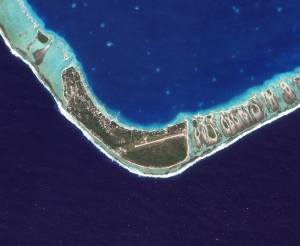 This case study demonstrates the importance of Cabot Institute research based on the environmental uncertainty of Small Island Developing States. Terra Sprague and Michael Crossley, based in the Graduate School of Education, received pump prime funding from the Cabot Institute which helped them to carry out research activity based around implications for sustainability and Education for Sustainable Development (ESD).
This case study demonstrates the importance of Cabot Institute research based on the environmental uncertainty of Small Island Developing States. Terra Sprague and Michael Crossley, based in the Graduate School of Education, received pump prime funding from the Cabot Institute which helped them to carry out research activity based around implications for sustainability and Education for Sustainable Development (ESD).
The project aimed to:
- Facilitate enhanced relationships and collaborative research partnerships across faculties at the University of Bristol, with other universities, and with Commonwealth bodies and NGOs working on issues of sustainability, Education for Sustainable Development (ESD) and the challenges of environmental uncertainty faced by small island states;
- Develop a series of outputs including an edited video of selected conference activities, public media engagement, a number of posts for different UoB and external blogs;
- Develop possibilities for multidisciplinary research bids to bodies such as DfID, AusAID, ESRC or AHRC;
- Highlight the perspectives of small island states, and their realities of living with environmental change and uncertainty, in ways that impact on the current global discourse on climate change.
- Infuse this small state experience into the Cabot Institute and Bristol Green Capital activities.
Together with Sazani Associates, a Wales and Zanzibar-based NGO, and in consultation with Cabot Institute, Terra and Michael organised an international day conference, hosted by the University of Bristol Graduate School of Education and the Education in Small States Research Group within the Research Centre for International and Comparative Studies (ICS). The day conference held on 17 July 2014, brought together over 100 researchers, practitioners and policy makers to discuss the realities of living with environmental uncertainty in small island states and the implications for Education for Sustainable Development and Sustainable Development.
Watch the conference overview (00:03:27):
Watch the extended highlights from the conference (00:32:06):
A keynote address was given by Her Excellency, Dame Pearlette Louisy, Head of State and Governor General of Saint Lucia. Other plenary sessions included contributions from the Pacific and Indian Ocean regions, and a presentation from Prof Rich Pancost. Three afternoon breakout sessions gave participants the opportunity to learn about and engage with multidisciplinary research, agency and practitioner perspectives. A total of 12 presentations ranged from coral reef research, hydroponics initiatives, climate change adaptation, international development agency projects, Pacific women’s perspectives and more.
Watch Dame Pearlette's talk:
The second day saw an interdisciplinary research planning workshop that brought together a more concentrated group of 18 high-level participants from the day conference. By drawing upon themes that emerged from the conference itself, this pump-priming workshop allowed the group to engage in the development of new international research partnerships relating to environmental uncertainty, sustainable development and ESD. The day was used to initiate plans for a further multidisciplinary research bid and resulted in the formulation of a UN recognised Small Island Developing States (SIDS) Partnership including 22 organisations from small states, international agencies, and associated research universities worldwide.
Impacts
One of the immediate outcomes was the formal acceptance and launching of this cross-regional SIDS Partnership at the 3rd UN International Conference on SIDS in Samoa. The partnership, titled ‘Learning from the Sharp End of Environmental Uncertainty in SIDS’ will serve as a global vehicle to enhance the work begun at the day conference and research workshop. It will do this by carrying out a number of activities planned by Partnership members including curriculum development initiatives, seminars and training events, policy advice and multidisciplinary research projects in collaboration with SIDS worldwide. The combination of partnership members from academic institutions, policy think tanks and technical organisations provides an exciting and unique collaboration for research and the realisation of effective engagement with the challenges of environmental uncertainty and sustainable development in SIDS. This is designed to stimulate learning from the collective SIDS experience for the wider world. The Education in Small States Research Group within the University of Bristol Graduate School of Education will serve as Partnership Secretariat. In addition, a first publication output (Sprague et al 2014) has been developed and accepted to inform and engage high-level policy makers across the Commonwealth, in preparation for the 2015 Conference of Commonwealth Education Ministers (CCEM) to be held in The Bahamas.
Find out more
To find out more about Small Island States research at the Cabot Institute, visit http://www.bris.ac.uk/education/research/centres/ics/smallstates/sharpend/
Further reading and media
Sprague, T., Crossley, M., Holmes, K., 2014. At the sharp end: Education for sustainable development in small states, in: Jones-Parry, R., Robertson, A. (Eds.), Commonwealth Education Partnerships 2014-15. Nexus/Commonwealth Secretariat, Cambridge, pp. 298–304.
Education for sustainable development: Implications for small island developing states (SIDS) by Michael Crossley and Terra Sprague
Full text: Dame Pearlette Louisy keynote speech (PDF, 1,431kB) [PDF, 1.39 MB]
Programme: View the conference programme
Images: View images from the conference (Flickr)
Video: Watch the conference overview (00:03:27) (YouTube)
Video: Watch the keynote speech by Dame Pearlette Louisy (01:00:00) (YouTube)
Video: Watch the extended highlights from the conference (00:32:00) (YouTube)
Blog: Learning from the sharp end: Education for sustainable development in small states
Blog: Pearls of wisdom: The importance of knowledge exchange when facing environmental uncertainty
Blog: The sinking Pacific – climate change and international aid in Tuvalu
Notes
This case study and its content has been created in association with the Cabot Institute, the University of Bristol's Graduate School of Education, Sazani Associates and JellyMonster Productions.





